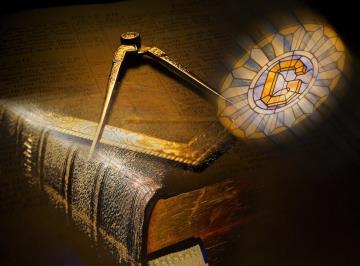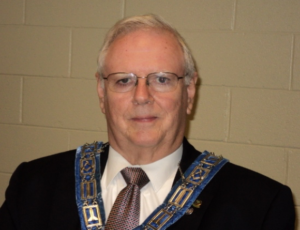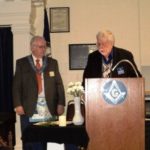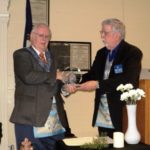Posted by Ben
Freemasonry Is…A Builder of Society Freemasonry

Freemasonry is a fraternity of men bound together by vows of morality in both public and private life, who believe in God and the constitutional rights of members to free choice of religion and political persuasion. Masonry strives to make good men better — to teach its members to be “better than themselves.” It accepts only men of high moral character. Freemasonry encourages self-improvement, promotes patriotism and respect for the Constitution, sanctions equal rights under law, practices good will towards all men, and contributes generously to philanthropies. Its basic tenets are Brotherly Love, Relief, (philanthropy), and Truth.
Through the improvement and strengthening of the character of the individual man, Freemasonry seeks to improve the community. Masonry is not a benefit society, or a charitable institution. It assists members by many means through times of hardship, but it is not an insurance society with death, disability or old age benefits.
Masonry is most certainly not a secret society. It is a well-known, world-wide fraternity whose members declare their membership and proudly wear the emblems of the Craft. Masons meet in buildings plainly identified as Masonic Temples, and there is no attempt to hide the names of community leaders who are Masons.
Masonic ritual is often considered by Masons as having been one of the most moving experiences of their lives. Employing the tools of the stone mason as symbols of basic moral truths, Masonic ritual dramatizes a philosophy of life based on morality.
Masonry is voluntary! A Mason is forbidden by Masonic law to invite a friend to join. The friend must voluntarily seek membership by contacting a Mason and indicate his desire to join.
The bond of faith and confidence among Masons is largely the result of the common knowledge that all, having experienced the memorable rituals, accept the high ethical standards as guides to their conduct. Within a Masonic Temple Masons do not discuss religion, politics, or any other subject likely to excite heated discussions. Masonry teaches men to be religious without advocating a particular doctrine, or creed. It requires its members to be good citizens, but free to choose their medium of political expression.
Throughout the history of North America the Masonic fraternity has supported free public schools in all possible unofficial and non-political ways … as an expression of good citizenship. “Let there be light” is a famous Masonic motto in support of this philosophy.
Adapted from: web.mit.edu/dryfoo/Masonry/
Read MorePosted by Ben
2017 J. Ned Culler Award

The 2017 J. Ned Culler Award for Masonic Excellence was awarded to Wor. Gerald Wayne Boswell.
Click here to read the whole story…
Read MorePosted by Ben
Some things you may not know about Freemasonry
Freemasonry is not a religion.
Freemasonry perhaps has the look of a religion. You think of religion as ritual, there’s also this ritual element. But there are no priests; there are no ministers, rabbis, no system of clergy of any sort. Everybody’s their own thinker. There are certain subjects that are not open for discussion within the lodge. Religion is one, politics is the other.
Atheists are not welcome.
Freemasonry is not a religion but agnostics or atheists cannot belong. A belief in a Supreme Being is necessary. So could an atheist join? The reason we want somebody that has a belief in a supreme being is because we take certain obligations to be a good man, to support the fraternity and the community. If you don’t have a belief in a supreme being, the obligation would be meaningless.
Most of the Founding Fathers were NOT Freemasons.
Two of America’s earliest presidents, George Washington and James Monroe, were Freemasons, as were Benjamin Franklin, John Hancock and Paul Revere. But many leading figures in the American Revolution — including John and Samuel Adams, Thomas Jefferson, James Madison and Thomas Paine — were not Masons. Of the 56 men who signed the Declaration of Independence, only nine were confirmed Masons, and of the 39 delegates of the Continental Congress who signed the draft of our nation’s Constitution in 1787, only 13 (one-third) were Freemasons.
There are NO secret Masonic symbols on the U.S. dollar bill.
The back of the dollar bill features an incomplete pyramid with an ‘all seeing eye’ on top of it. Many people say it’s a Masonic symbol, but that’s not the case. These symbols have been used by many different groups, including Masons, throughout history.
The Shriners are Freemasons.
The Shriners (known formally as the Ancient Arabic Order Nobles of the Mystic Shrine) the charity organization best known in the popular mind for driving tiny cars in parades are an off-shoot of Freemasonry. They support 22 children’s hospitals where patients don’t pay a cent for medical care and Doctor’s services.
The secret Masonic password originated as a job tool.
Masonry began as a guild for stone masons who built the castles, cathedrals, and public buildings of Medieval Europe. If you were a baker, a miller, a brewer, you could spend your entire life in one village practicing your trade. If you were a mason, after they repaired the church or built the town hall, there might not be any mason work in that town for decades, so you had to move on to another jobsite.
Back then, you as a tradesman were most likely illiterate; perhaps the officers of the lodge were also illiterate. That’s why the ‘Masons word’ came into effect. It allowed the craftsmen to move from one jobsite to another and identify themselves as being part of the trade union. There is evidence in Scotland going back to the early 1600’s that the Masons’ word existed. That was how you as a Mason in Edinburgh could identify yourself to a Mason in Lancashire that you were a member of the guild and could have work. Are there secret handshakes? Oh, secret handshakes, of course. What’s the point of having a password if you don’t have a handshake?
Read MorePosted by Ben
300 Years of English Freemasonry
Officially, the Grand Lodge of England was founded in London on St. John the Baptist’s day, June 24, 1717, when four existing Lodges gathered at the Goose and Gridiron Ale-house in St. Paul’s Church-yard in London and constituted themselves a Grand Lodge. The four lodges had previously met together in 1716 at the Apple-Tree Tavern, “…and having put into the Chair the oldest Master Mason (now the Master of a Lodge), they constituted themselves a Grand Lodge pro Tempore in due form.” It was at that meeting in 1716 that they resolved to hold the Annual Assembly and Feast and then choose a Grand Master from among themselves, which they did the following year.
Read More

